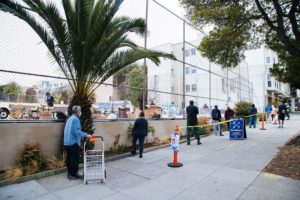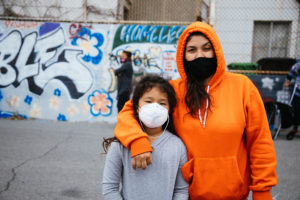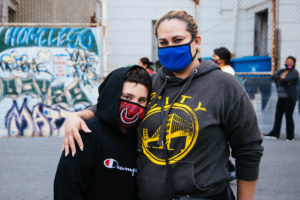 Each week, Diana and Cristina* wait patiently to get food at our Mission High School Pop-up Pantry.
Each week, Diana and Cristina* wait patiently to get food at our Mission High School Pop-up Pantry.
“I’ve been laid off for three months because of this virus,” said Cristina, who worked as a hotel housekeeper. “Most of the money goes to bills.”
Diana, a friend of Cristina’s who worked as a cashier at a café, echoes that concern. “The money that I do get is only for paying bills, and I don’t have that much money left to buy food.”
The Food Bank is open to all, and they are among many immigrant participants who benefit from the groceries at our Pop-up pantries. However, for Diana and Cristina who are also undocumented, the Food Bank is one of the few supports to get them through the week.
Weathering the Pandemic Without a Safety Net
 Prior to COVID, immigrant families were already impacted by the changes to the long-standing Public Charge rule. Undocumented immigrants who keep their government benefits such as CalFresh (food stamps) for more than 12 months within any 36-month period are barred from obtaining lawful permanent (or “green card”) status. As pandemic-related job losses exacerbate the need for food assistance, rules like Public Charge force families to balance seeking help with remaining in this country.
Prior to COVID, immigrant families were already impacted by the changes to the long-standing Public Charge rule. Undocumented immigrants who keep their government benefits such as CalFresh (food stamps) for more than 12 months within any 36-month period are barred from obtaining lawful permanent (or “green card”) status. As pandemic-related job losses exacerbate the need for food assistance, rules like Public Charge force families to balance seeking help with remaining in this country.
Many resources are currently available to weather this pandemic but are inaccessible for undocumented immigrants like Cristina and Diana. For example, while both women lost their jobs due to COVID-19, they are still ineligible to receive unemployment benefits. Undocumented immigrants were able to receive a one-time disaster relief assistance fund and support from nonprofit groups due to ineligibility for federal assistance.
The Governor also recently passed an expansion of the state’s Earned Income Tax Credit this year, allowing all tax filers, including undocumented people who pay taxes, to receive a tax credit. This policy change will put money back in the pockets of nearly 600,000 undocumented California taxpayers.
However, these are not long-term solutions and not every family is able to continue to receive assistance elsewhere. Bills such as AB 826, which would’ve provided emergency food assistance by distributing pre-paid grocery cards through food banks and immigrant-serving organizations to low-income communities including undocumented immigrants, was recently vetoed by Governor Newsom.
Currently, there aren’t any other bills to provide food aid to undocumented immigrants throughout this pandemic.
Navigating Remote Learning
 As single mothers and Spanish speakers, both Diana and Cristina found it challenging to find ways to educate their children while schools were closed. Although their children can speak English, the language barrier made it even more challenging for homeschooling.
As single mothers and Spanish speakers, both Diana and Cristina found it challenging to find ways to educate their children while schools were closed. Although their children can speak English, the language barrier made it even more challenging for homeschooling.
“I try to create projects to keep my daughter busy and educated,” said Diana.
On top of navigating homeschooling and distanced learning in a second language, Cristina and Diana were constantly ensuring their children, who typically received meals at school, were getting enough to eat each week.
The Need to Feed
Like many of us during shelter-in-place, both Diana and Cristina are concerned about catching COVID-19, especially knowing the Latinx population makes up an increasing proportion of COVID-19 cases in California due to historic inequities.
“I’ve been feeling a bit trapped, but also afraid of going outside,” said Diana. “Still, I need to come here so that I can feed my seven-year-old daughter, Maria.”
“If these programs didn’t exist, I feel like I wouldn’t be able to properly feed my son,” said Cristina, as she tightly hugged her son. “It especially helps because if my son wants specific foods, at least I’ll be able to use this food as a daily staple without feeling guilty about it.”
*Names used in this blog post are aliases to protect the identities of the participants



Share